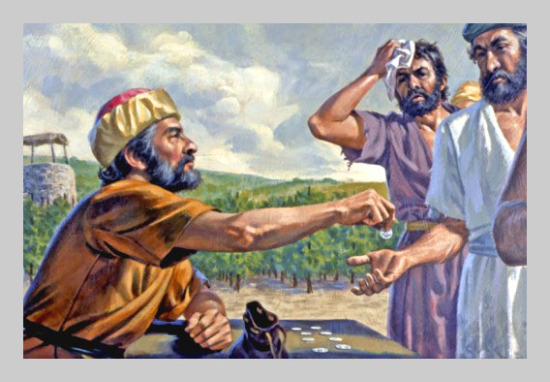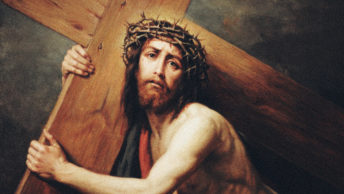The pastor of a parish in a farming community, Father Kelley, asked one of his parishioners, a man named Mr. Bucholz, to serve as chairman of the parish’s finance commission and coordinate their capital campaign. Mr. Bucholz, who managed the local grain elevator, agreed on two conditions: first, no report on his fund-raising efforts would be due for one year; second, during that year, no one would ask any questions of him. The conditions were accepted, and a year later, during the announcements at all the weekend Masses, Mr. Bucholz reported that he had raised enough money to pay off the parish debt of $200,000, plus $50,000 to redecorate the church, and $1000 to send to the missions, with an additional $5000 left over. Father Kelley and the congregation were stunned by this good news, and asked, “How did you do all this?” Mr. Bucholz answered, “You people bring your grain to my elevator. As you did business with me this past year, I simply withheld 10% of all your transactions and gave it to the church. You never missed it” (Homily Notebook, “Stewardship,” The Pastor’s Story File, Nov. 1984, p. 4). This true story reminds us that most people are able to give back to God much more than they realize. The reason many of us have difficulty tithing, or practicing stewardship and sacrificial giving, is that we look at things from our point of view: “How can I afford this?”, or “How much will this cost me?”, or “What will I have to give up?” When we look at everything from God’s point of view, however, we see things quite differently—and this allows miracles of generosity to occur.
Ancient societies didn’t have Social Security and welfare programs, food stamps, or government-sponsored soup kitchens, and very few people had money in the bank; for many people, survival was literally a day-to-day challenge and struggle, and if a man didn’t earn a daily wage one day, his family wouldn’t eat the next day. That’s why, seen from God’s point of view, the vineyard owner in Matthew’s Gospel (20:1-16) was quite properly being generous: he was paying even those who had worked only an hour a full day’s wage, ensuring that the families of those men wouldn’t go hungry. That was a just, noble, and lavish act on his part—but instead of praising him for his compassion, the other workers complained and somehow thought they were being treated unfairly. Their lack of compassion—and in effect, their willingness to see innocent women and children go without food the next day—was rooted in their own selfish perspective. When we see things only in terms of whether or not they benefit us personally, we lose sight of the larger picture and close ourselves off to God’s truth and blessings. The Prophet Isaiah (55:6-9) tells us that God’s ways are far above our ways, and His thoughts far beyond our thoughts—but divine grace can change and enlighten us. Likewise, St. Paul (Phil 1:20-24, 27) states that instead of choosing what he personally wants, he prefers his life unfold in whatever way gives greater glory to God—and if we too choose to live in this generous and trusting spirit, the Lord will bless us with a happiness and peace we could never have achieved on our own.
The workers in the vineyard didn’t understand this concept, but Jesus is asking more of us—and deciding upon our response requires a serious and honest process of prayerfully seeking His guidance in determining how much we can give, while remembering that we can only expect to be blessed and rewarded by God to the same degree we practice generosity. Earlier this year a man named Henry shared this story with me.
He was in a large hardware store (a Lowe’s or Home Depot) when a street person, who seemed to suddenly appear from out of nowhere, asked him for some money to get a meal at the McDonald’s next door. Henry gave him $2, then watched as he left the store; he wanted to see if the man actually went to McDonald’s, and also because he sensed there was something “different” (in a holy sense) about him. As Henry watched, the man approached the door to McDonald’s, but then—before he entered the fast-food restaurant—suddenly disappeared into thin air. Henry couldn’t believe his eyes at first, but reminded himself he knew there was something different about the man—and then realized he had been tested in a mystical encounter. Remembering Our Lord’s words “Whatever you do for the least of My brothers, you do for Me,” Henry said to himself, “I just saw Jesus Christ—and I gave Him only two bucks!”
We wouldn’t want to give someone only $2, and afterwards regret it when we found out it was Jesus Himself; we’d feel guilty knowing we could have acted generously and made a real sacrifice, but had chosen not to do so. Just as it was rather selfish and petty for the vineyard workers to complain when the owner generously helped other men to feed their families, so it will be disappointing to the Lord if we, in response to His invitation to express our gratitude to Him by practicing genuine stewardship and sacrificial giving, ignore this opportunity or make only a token commitment. We won’t be having a local grain elevator operator or businessman secretly withhold some of our income and give it to the Church; we must knowingly make that decision ourselves. The Lord wants us to relate to others in a generous spirit, just as He does to us. As we pray and reflect, let’s remember that true and lasting happiness can only come by seeing everything from God’s point of view. May we act accordingly.








